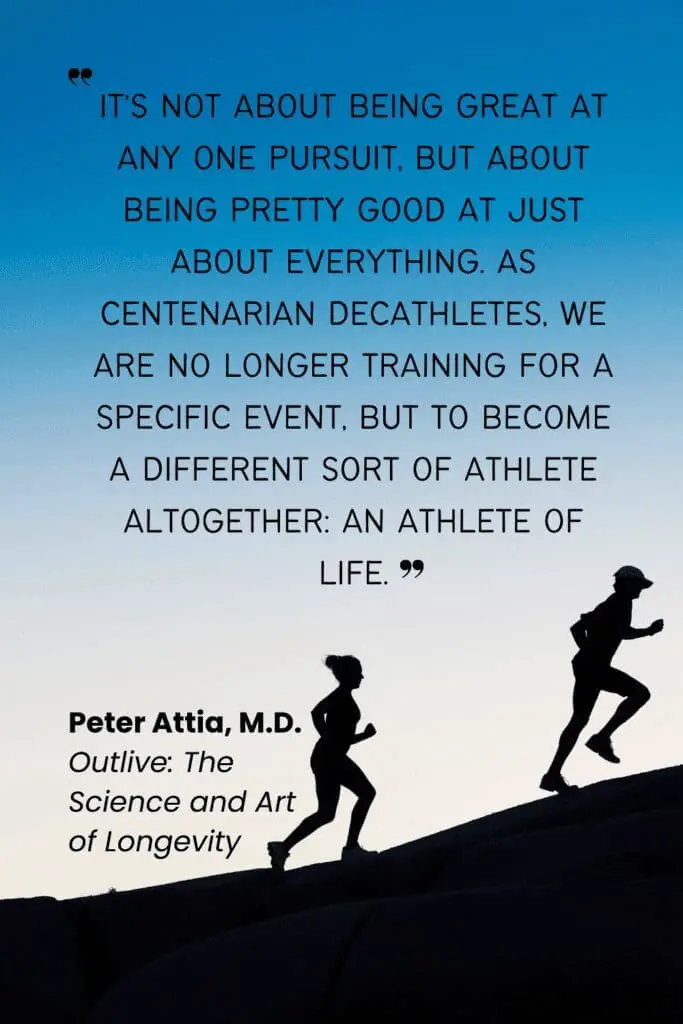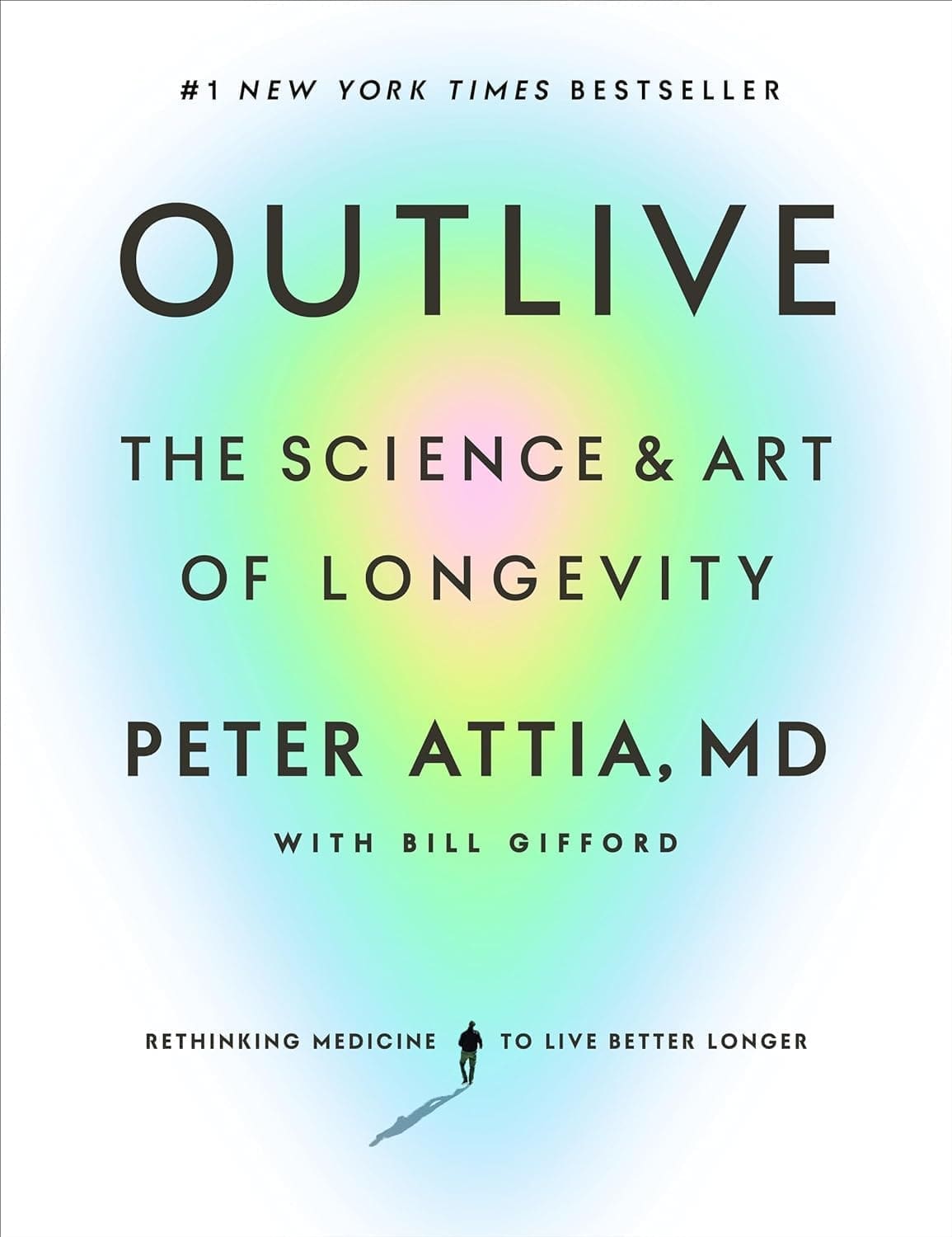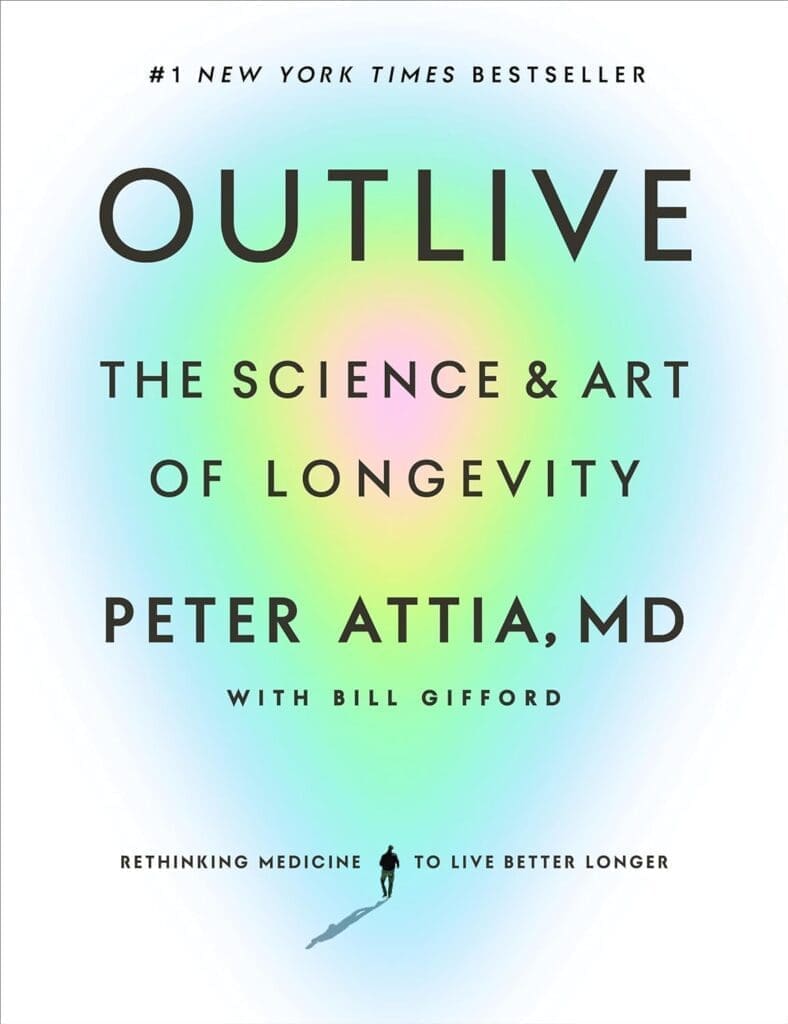I am slightly obsessed with the “science and art of longevity,” the tagline of Peter Attia’s recent bestselling book, Outlive.
While I know part of the allure is the pursuit of the fabled “fountain of youth,” I’m also repeatedly amazed at the body’s ability to regulate, destroy, and/or heal itself as the case may be. Cancer and dementia are potential risk factors in my family, particularly on the female side of genetics, and those potentials for my own future haunt my thoughts on a fairly regular basis.
In general, I’m healthy. I’ve eaten a pescetarian version of the Mediterranean diet for years now, I exercise for give or take 30 minutes every day in some form or fashion, and in recent years I’ve turned to yoga, meditation, and writing to channel my stress and anxiety.
I look and feel basically the same as I did in my 20s, but how long will that last? At what point does the tide turn, and can I hold it back or even reverse its course?
Is what I’m doing enough?
These are some of the questions that Peter Attia addresses in his book, and within those 411 pages, 17 chapters, plus an epilogue, he has given plenty of food for thought. While we want the quick fixes and the immediate results, it’s that mentality that Attia warns against, and he advises that his book is not that kind of advice.
Yes, you can jump ahead and get the tips for healthier blood tests, lessened metabolic dysfunction, mitigated risk for dementia, etc… but you have to start thinking of the body as a whole and how mindset and emotions play a role in longevity as well. The goal is not only to “outlive” our ancestors but also to live better with the knowledge in hand regarding why we want to live so long and what we want to do with those extra years.
While there are numerous good points to take away from reading this book, the best advice I found in Outlive was to start now. Exercise now, eat better now, mentally care for myself now, and get ahead of any diseases through more thorough screenings now.
Below is a list of my top highlighted quotes and takeaways from Outlive by Peter Attia, but for the whole understanding and implementation, you need to read the book in its entirety.
quotes from outlive
26 Top Quotes from Outlive by Peter Attia (with page numbers)
1. “Exercise is by far the most potent longevity ‘drug.’ No other intervention does nearly as much to prolong our lifespan and preserve our cognitive function. But most people don’t do nearly enough–and exercising the wrong way can do as much harm as good.” Chapter 1: The Long Game: From Fast Death to Slow Death, pg. 17
2. “First, Medicine 3.0 places a far greater emphasis on prevention than treatment. […] In Medicine 3.0, our starting point is the honest assessment, and acceptance, of risk–including the risk of doing nothing. […] Medicine 3.0 pays far more attention to maintaining healthspan, the quality of life.” Chapter 2: Medicine 3.0: Rethinking Medicine for the Age of Chronic Disease, pgs. 31-33
3. “how much food we eat correlates somehow with how long we live. This idea goes all the way back to Hippocrates, but more modern experiments have demonstrated, over and over, that reducing the food intake of lab animals could lengthen their lives.” Chapter 5: Eat Less, Live Longer: The Science of Hunger and Health, pg. 79
4. “If we want to reduce deaths from cardiovascular disease, we need to begin thinking about prevention in people in their forties and even thirties.” Chapter 7: The Ticker: Confronting–and Preventing–Heart Disease, the Deadliest Killer on the Planet, pg. 135
5. “Another surprising intervention that may help reduce systemic inflammation, and possibly Alzheimer’s disease risk, is brushing and flossing one’s teeth. (You heard me: Floss.)” Chapter 9: Chasing Memory: Understanding Alzheimer’s Disease and Other Neurodegenerative Diseases, pg. 203
6. “I’m not quite as confident that regular sauna use will reduce your risk of Alzheimer’s disease as I am that exercise will do so, but I am much more confident than I was at the outset of my journey. The best interpretation I can draw from the literature suggests that at least four sessions per week, of at least twenty minutes per session, at 179 degrees Fahrenheit (82 degrees Celsius) or hotter seems to be the sweet spot to reduce the risk of Alzheimer’s by about 65 percent (and the risk of ASCVD by 50 percent).” Chapter 9: Chasing Memory: Understanding Alzheimer’s Disease and Other Neurodegenerative Diseases, pg. 204
7. “More than any other tactical domain we discuss in this book, exercise has the greatest power to determine how you will live out the rest of your life. There are reams of data supporting the notion that even a fairly minimal amount of exercise can lengthen your life by several years. It delays the onset of chronic diseases, pretty much across the board, but it is also amazingly effective at extending and improving healthspan. Not only does it reverse physical decline, which I suppose is somewhat obvious, but it can slow or reverse cognitive decline as well. (It also has benefits in terms of emotional health, although those are harder to quantify.)” Chapter 11: Exercise: The Most Powerful Longevity Drug, pg. 217
8. “The Centenarian Decathlon is a framework I use to organize my patients’ physical aspirations for the later decades of their lives, especially their Marginal Decade. I know, it’s a somewhat morbid topic, thinking about our own physical decline. But not thinking about it won’t make it any less inevitable.” Chapter 11: Exercise: The Most Powerful Longevity Drug, pg. 231
9. “we must stop pointlessly “exercising,” just because we think we are supposed to, banging away on the elliptical trainer at lunch hour. I promise, you can do better. I suggest you join me and start training, with a very specific purpose, which is to be kick-ass one-hundred-year-olds.” Chapter 11: Exercise: The Most Powerful Longevity Drug, pg. 234

10. “It’s not about being great at any one pursuit, but about being pretty good at just about everything. As Centenarian Decathletes, we are no longer training for a specific event, but to become a different sort of athlete altogether: an athlete of life.” Chapter 11: Exercise: The Most Powerful Longevity Drug, pg. 234
11. “The key is to find an activity that fits into your lifestyle, that you enjoy doing, and that enables you to work at a steady pace that meets the zone 2 test: You’re able to talk in full sentences, but just barely.” Chapter 12: Training 101: How to Prepare for the Centenarian Decathlon, pg. 243
12. “it seems that about three hours per week of zone 2, or four 45-minute sessions, is the minimum required for most people to derive a benefit and make improvements, once you get over the initial hump of trying it for the first time.” Chapter 12: Training 101: How to Prepare for the Centenarian Decathlon, pg. 243
13. “my first commandment of fitness: First, do thyself no harm.” Chapter 13: The Gospel of Stability: Relearning How to Move to Prevent Injury, pg. 265
14. “So if we are to complete the goals we have set in our own Centenarian Decathlon, we need to be able to anticipate and avoid any potential injuries that lie in our path, like icebergs at sea. This means understanding stability and incorporating it into our routine.” Chapter 13: The Gospel of Stability: Relearning How to Move to Prevent Injury, pg. 265
15. “My personal bottom line: if you drink, try to be mindful about it. You’ll enjoy it more and suffer fewer consequences. Don’t just keep drinking because they’re serving it on the plane. I strongly urge my patients to limit alcohol to fewer than seven servings per week, and ideally no more than two on any given day” Chapter 15: Putting Nutritional Biochemistry into Practice: How to Find the Right Eating Pattern for You, pg. 321
16. “If there is one type of food that I would eliminate from everyone’s diet if I could, it would be fructose-sweetened drinks, including both sodas and fruit juices, which deliver too much fructose, too quickly, to a gut and liver that much prefer to process fructose slowly. Just eat fruit and let nature provide the right amount of fiber and water.” Chapter 15: Putting Nutritional Biochemistry into Practice: How to Find the Right Eating Pattern for You, pg. 347
17. “Taking a nap during the day, while sometimes tempting, can also relieve too much of that sleep pressure, making it harder to fall back asleep at night.” Chapter 16: The Awakening: How to Learn to Love Sleep, the Best Medicine for Your Brain, pg. 373
18. “The overarching point here is that a good night of sleep may depend in part on a good day of wakefulness: one that includes exercise, some outdoor time, sensible eating (no late-night snacking), minimal to no alcohol, proper management of stress, and knowing where to set boundaries around work and other life stressors.” Chapter 16: The Awakening: How to Learn to Love Sleep, the Best Medicine for Your Brain, pg. 374
19. “If you find yourself lying awake in bed, unable to get back to sleep, my advice is to stop fighting it. Get up, go into another room and do something relaxing. Fix a cup of tea (noncaffeinated, obviously), and read a (preferably boring) book until you feel sleepy again. The key, says Vikas Jain, is to find something that is relaxing and enjoyable but that serves no function; you never want to give your insomnia a purpose, such as doing work or paying bills, because if you do, your brain will make sure to wake you up for it on a regular basis.” Chapter 16: The Awakening: How to Learn to Love Sleep, the Best Medicine for Your Brain, pg. 376
20. “The substance-abuse crisis has created a longevity crisis, because it is really a mental health crisis in disguise. This type of suffering is far more prevalent than suicide rates would suggest. It simply robs you of the joy that enables you to focus on your health, life, and relationships with others, so that instead of living, you are merely waiting to die. This is why I’ve come to believe that emotional health may represent the most important component of healthspan. Nothing else about longevity is really worth much without some degree of happiness, fulfillment, and connection to others. And misery and unhappiness can also destroy your physical health, just as surely as cancer, heart disease, neurodegenerative disease, and orthopedic injury.” Chapter 17: Work in Progress: The High Price of Ignoring Emotional Health, pg. 382
21. “It took me a while to recognize this, but feeling connected and having healthy relationships with others, and with oneself, is as imperative as maintaining efficient glucose metabolism or an optimal lipoprotein profile. It is just as important to get your emotional house in order as it is to have a colonoscopy or an Lp(a) test, if not more so. It’s just a lot more complicated.” Chapter 17: Work in Progress: The High Price of Ignoring Emotional Health, pg. 382
22. “Addressing emotional health takes just as much constant effort and daily practice as maintaining other aspects of our physical health by creating an exercise routine, following a nutritional program, adhering to sleep rituals, and so on. The key is to be as proactive as possible, so that we can continue to thrive in all domains of healthspan, throughout the later decades of our lives.” Chapter 17: Work in Progress: The High Price of Ignoring Emotional Health, pg. 389
23. “I visualize my distress tolerance as a window that opens and closes vertically. The narrower this window becomes, the more likely I am to become dysregulated. My goals are to keep this window as wide as possible and to be very attentive to anything that might narrow it, even factors outside my control (see figure 15). Many behaviors expand this window: exercise, sound sleep, good nutrition, time with my family, medications such as antidepressants or mood stabilizers, deep social connections, spending time in nature, and recreational activities that do not emphasize self-judgment. These are the things I have control over. I don’t have as much control over the things that compress my window, but I still have some—for example, overcommitting to projects and saying yes to more than I should. Managing this window (in part by learning to say no) and trying to keep it as wide as possible is something I think about and work on almost every day.” Chapter 17: Work in Progress: The High Price of Ignoring Emotional Health, pg. 401
24. “One tactic that I’ve found especially helpful is called opposite action—that is, if I feel like doing one thing (generally, not a helpful or positive thing), I’ll force myself instead to do the exact opposite. By doing so, I also change the underlying emotions.” Chapter 17: Work in Progress: The High Price of Ignoring Emotional Health, pg. 405
25. “This is the key step. You have to believe you can change—and that you deserve better.” Chapter 17: Work in Progress: The High Price of Ignoring Emotional Health, 407
26. “ ‘I think people get old when they stop thinking about the future,’ Ric [Elias] told me. ‘If you want to find someone’s true age, listen to them. If they talk about the past and they talk about all the things that happened that they did, they’ve gotten old. If they think about their dreams, their aspirations, what they’re still looking forward to—they’re young.’ Here’s to staying young, even as we grow older.” Epilogue, pg. 411
Related Posts:

